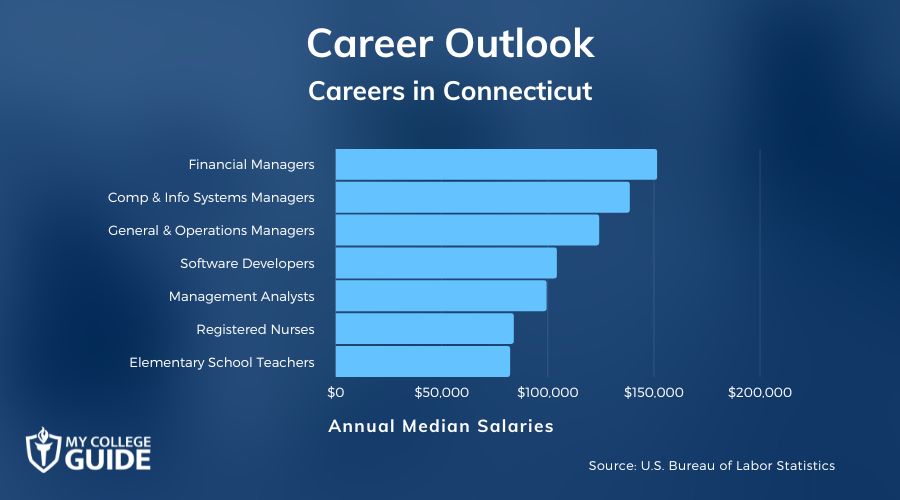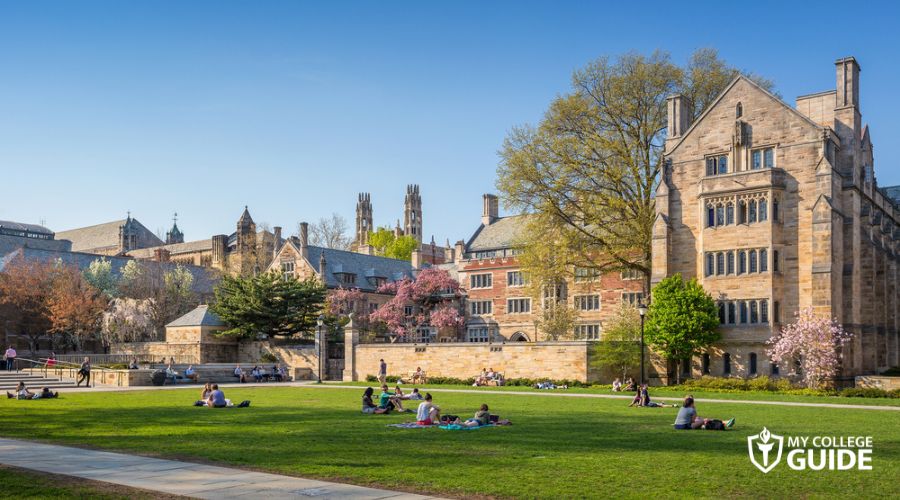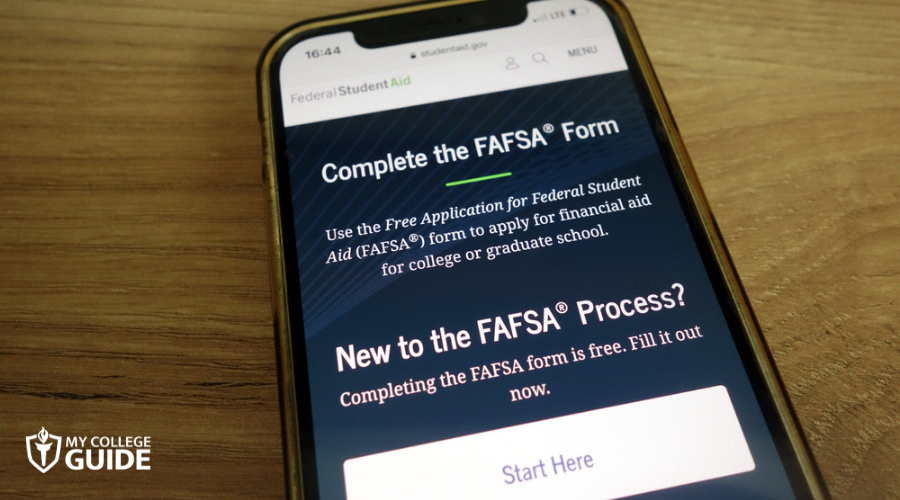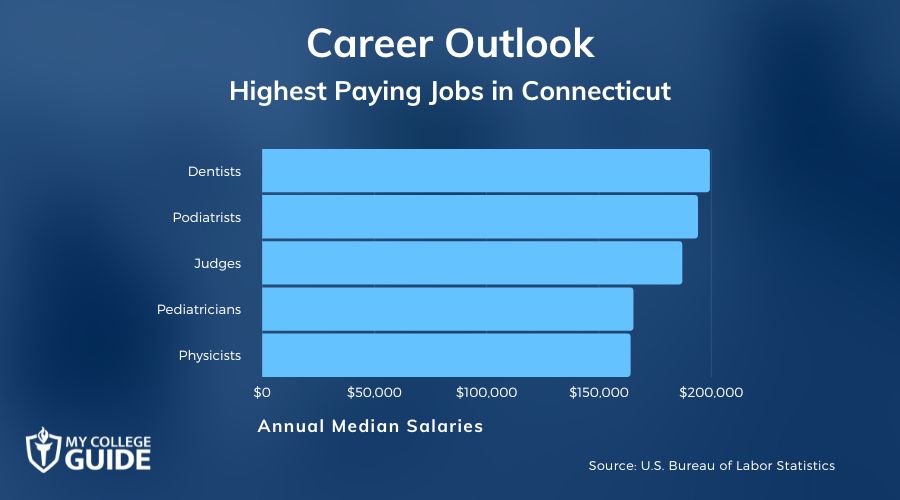Despite its size, there are many online colleges in Connecticut for students to continue their education. Connecticut is ranked as one of the most educated states in the nation, with impressive percentages of residents holding high-level degrees.

Students in the state can choose from large universities, mid-size colleges, liberal arts colleges, or even community colleges in Connecticut. Most of the schools offer learning opportunities both online and on campus.
Connecticut is a state with a strong commitment to both higher education and online learning.
Online Colleges in Connecticut

Connecticut was a pioneer in online learning. The Connecticut Distance Learning Consortium (CTDLC) was launched to provide support and services to online educators, and many of the institutions in the state were among the nation’s first to offer online courses.
According to the National Center for Education Statistics (NCES), approximately 22% of Connecticut higher education students were enrolled in online courses exclusively. Another 28% of students were participating in some combination of online and on-campus courses.
Editorial Listing ShortCode:
The learning format at accredited online colleges often appeals to adult learners, parents, people with medical conditions, and those who need to maintain full-time employment, as well as many others.
Connecticut online schools are often an excellent option for individuals who want a degree from a Connecticut institution but live outside the state.
Most of the state’s top universities offer online degree programs, including some that focus exclusively on online learning and offer associate, bachelor’s, and master’s degree programs in areas such as health care, business, information systems, and more.
Common Online Degrees in Connecticut

Online schools in Connecticut offer a variety of associate’s, bachelor’s, master’s, and doctoral degree programs. These are some of the most common degree fields available:
- Communication and Media Studies: A degree in communication and media studies typically covers how to gather and share information through different mediums, including online, in print, and on television. Graduates might go on to become on-air reporters, grant writers, or public affairs specialists.
- Finance: Finance degree programs usually serve as preparation for careers in accounting, sales, analytics, or management. The curriculum typically includes coursework in statistics, economics, and business law.
- Education: While earning an education degree, students typically learn about classroom management, pedagogical best practices, and how to teach children with diverse needs and backgrounds. An education degree is a logical step if you hope to become a teacher in a public or private school.
- Psychology: Psychology is the study of the human mind and behavior, and many graduates of psychology programs become counselors, human resources specialists, educators, or licensed psychologists. Students in these programs typically focus on topics like cognition, mental health disorders, and abnormal behavior.
- Business: Degrees in business are very versatile and can help students become professionals in management, marketing, advertising, or accounting. Common coursework includes entrepreneurship, finance, leadership skills, and ethics.
Pursuing Connecticut online degrees offers the opportunity to gain valuable training and knowledge in your area of interest. This can help strengthen your resume for a variety of careers and industries.
Overview of Higher Education in Connecticut

There are 37 degree-granting institutions in Connecticut, according to the NCES. Of the 37 schools, 18 are public, 17 are nonprofit, and 2 are for-profit.
Additional data from the NCES shows that in-state public tuition to one of Connecticut’s 4-year institutions runs $14,487 a year, on average. Out-of-state tuition is much higher, at $36,881. Both are thousands above the national average.
Connecticut is home to several prestigious schools, some of which are ranked among the top 25 public universities in the nation.
Connecticut is a part of the New England Regional Student Program. This allows residents to enroll in degree programs in Maine, Massachusetts, New Hampshire, Rhode Island, and Vermont if those programs are not offered by public schools within their home state of Connecticut.
Employment Outlook for College Graduates in Connecticut

More than 1.5 million people work in Connecticut. For college graduates, the most popular industries include financial services, agriculture, tourism, and business. The job market in the state is projected to grow steadily in many industries, with strong growth in management, healthcare, education, and financial operations.
According to the U.S. Bureau of Labor Statistics (BLS), the median annual salary for all occupations in Connecticut is $48,710. This is higher than the national median annual wage for all occupations, which is $45,760.
Several individual career paths in the state also have higher median annual salaries than the rest of the country. For example, financial managers in Connecticut have median salaries of $151,440 compared to the national rate of $131,710.
Careers & Salaries in Connecticut

Employers like government agencies, private businesses, nonprofits, and healthcare facilities seek educated candidates for jobs that require advanced critical thinking, analysis, and program-specific training. CT online degrees provide the opportunity to develop these skills.
After graduating with a college degree, you may be well-positioned to pursue a career in many growing industries in Connecticut. The state has many opportunities to work as a manager, educator, or healthcare professional.
Many of these positions offer healthy salaries that are higher than the national median wage for all occupations. According to the U.S. Bureau of Labor Statistics, these are some of the most popular careers for college graduates in Connecticut.
| Careers | Annual Median Salaries |
| Financial Managers | $151,440 |
| Computer and Information Systems Managers | $138,570 |
| General and Operations Managers | $124,130 |
| Software Developers | $104,170 |
| Management Analysts | $99,340 |
| Registered Nurses | $83,870 |
| Elementary School Teachers | $82,140 |
| Secondary School Teachers | $79,530 |
| Accountants and Auditors | $78,790 |
| Bookkeeping, Accounting, and Auditing Clerks | $48,320 |
These are average salaries for some of the careers available in Connecticut. The actual salary you can earn will be based on your experience, location, available career opportunities, and other factors.
Choosing a Connecticut Online College Program

When choosing the right Connecticut online college program, it can be important to evaluate your circumstances, needs, and goals. These are some factors you can take into account when making your decision.
- Format: Some online courses are offered synchronously, which means that all students must attend a live virtual session at the same time. Other courses are asynchronous and allow students to watch pre-recorded lectures and complete coursework at the time and place that works best for them.
- Accreditation: Accredited degree programs have been assessed for academic quality. Attending a college with accreditation status helps ensure that you will receive a quality education.
- Cost: It’s important to consider not only the cost of tuition but also any required fees and materials. Private online colleges and universities are often more expensive than public ones.
- Student support: High-quality online colleges typically offer student support services that are equivalent to those offered on a traditional campus. You may want to look for offerings like tutoring, career placement, and accessibility.
- Concentrations: Before enrolling in a college program, it is important to make sure it aligns with your career goals. For example, a business student might seek out a college that offers an international business concentration in preparation for a career in global marketing.
To learn more about the details of a particular online college program, you can reach out to an admissions counselor, do research online, or speak to alumni who have firsthand knowledge of the school.
Connecticut Online Colleges Admissions Requirements

Different online schools in CT may have very specific admissions requirements for prospective students, but many will likely have requirements in common. Some common criteria looked at when applying include:
- Test scores: Though it is becoming less common, some colleges require minimum standardized test scores for admission.
- Transcripts: Most schools require official transcripts from any previous academic institutions.
- Recommendation letters: Many programs request letters from former instructors who are familiar with your strengths.
- Personal statement: Many applications will ask you to include a brief essay that describes your career goals and interest in the program.
The admissions process for many online colleges also involves submitting one or more applications to the school and specific program you are interested in and payment of an application fee.
CT Online Colleges Accreditation

Attending accredited online degree programs in CT is much more beneficial than enrolling in a program without accreditation status.
Colleges can apply for national or regional accreditation, which involves a thorough assessment process. A regionally accredited college is typically ideal because the standards they must meet are extremely high. As a result, employers may look more favorably on a degree from this type of program.
Regional accreditation is also important if you plan to transfer to a different school or attend a graduate-level program in the future. Credits from regionally accredited institutions are usually easier to transfer.
Financial Aid and Scholarships

If you are pursuing a degree from one of the various CT online schools, it is a good idea to fill out the Free Application for Federal Student Aid (FAFSA). This form will determine the amount of federal financial aid you are eligible for. Many schools also use this form to determine school-specific aid as well.
Two popular types of financial aid are grants and scholarships because this money does not have to be repaid.
Here are some grants and scholarships available to qualifying Connecticut residents looking to obtain online degrees in CT:
- Better Business Bureau Student Ethics Scholarship: $2,500
- Connecticut Broadcasters Media Scholarship: $500-5,000
- Eileen Kraus Scholarship: $5,000
- Roberta B. Willis Scholarship – Need-Based Award: Up to $4,500
- Roberta B. Willis Scholarship – Need & Merit-Based Award: Up to $5,250 per year in a 4 year program. Up to $4,650 per year in a 2 year program
Many of Connecticut’s colleges and universities also offer scholarships and grants, so it’s helpful to check with the financial aid office at the school(s) you’re considering as well.
Additionally, if you are enrolled at least half-time at a Connecticut institution, you are likely eligible to borrow money through the Connecticut Higher Education Supplement Loan Authority (CHESLA). Most Connecticut residents are also eligible to borrow money through the CHESLA.
If you qualify, a CHESLA loan will allow you to borrow, at a low fixed interest rate, up to the full cost of your education minus any other aid you receive.
Connecticut Online Education Resources

If you are interested in online degree programs in Connecticut, the following resources may provide helpful guidance:
- Connecticut Office of Higher Education: The higher education office allows students to search for academic programs and find accredited institutions.
- Connecticut State Colleges and Universities: This site provides contact information and admissions details for college programs in Connecticut.
- New England Association of Schools and Colleges: The NEASC maintains an updated list of accredited colleges in Connecticut.
These resources can help make it easier to learn more about online programs within the state.
How Much Does It Cost to Go to an Online College in Connecticut?

The tuition costs at online colleges in CT are generally lower than the rates charged for traditional, in-person programs.
The cost of your degree will likely vary depending on whether you are classified as in-state or out-of-state.
In-state tuition is considerably lower at most schools. For example, the average cost for tuition per year at a 4 year, public university in Connecticut for an in-state student is $14,487, whereas it is $36,881 for an out-of-state student.
Tuition rates also depend on the type of school you attend. Public colleges are typically less expensive than private schools, and 2 year colleges usually have much lower rates than 4 year institutions.
Tuition Breaks for Out-of-State Students

Out-of-state students hoping to complete their degrees at colleges in Connecticut may have an opportunity to attend online and pay in-school rates. Connecticut is a part of the New England Board of Education (NEBHE), which has a tuition discount program for students in several states.
Other participating states are Vermont, Maine, Massachusetts, New Hampshire, Rhode Island, and Vermont.
Under the NEBHE program, students from any state who cannot find their desired major at a college in their home state may attend school in Connecticut at a reduced rate.
Some online programs also offer flat rates for online students, making their degree programs equally affordable regardless of residential status. In some cases, these colleges have additional fees for students who only attend classes online.
What Jobs Are in High Demand in Connecticut?

Professionals in many different industries have the potential to thrive in a position in Connecticut. According to the Connecticut Department of Labor, these are some of the most in-demand occupations in the state:
- General and operations managers
- Elementary school teachers
- Human resources specialists
- Accountants and auditors
- Financial managers
These positions not only have ample current openings but are also projected to have strong growth over time. If you’re hoping to build a career in Connecticut after earning a college degree, you may benefit from considering degree programs that align with these roles.
What Are the Highest Paying Jobs in Connecticut?

The amount of money you earn in a particular career in Connecticut depends on a number of factors. While your professional experience, level of education, and specific location ultimately determine how much you make, some career paths have higher median salaries than others.
Careers in healthcare have some of the most competitive salaries in the state. The Bureau of Labor Statistics reports that, in Connecticut, dentists have annual median earnings of $199,310. Podiatrists make $194,020 a year on average, and pediatricians earn $165,260 on average each year.
Other high-earning areas of employment in Connecticut include law and science. Judges have median salaries of $187,030 per year, while physicists have average yearly salaries of $164,010.
List of Online Colleges in Connecticut
Methodology: The following school list is in alphabetical order. To be included, a college or university must be regionally accredited and offer degree programs online or in a hybrid format.

Albertus Magnus College is dedicated to helping students create a college experience that fits into their lifestyle. Degrees can be earned fully online or in hybrid formats at an accelerated pace. Accelerated classes are 8 weeks long, and up to 30 credits can be earned each year.
The school offers associate, bachelor’s, and master’s degrees in fields like finance, writing, and cybersecurity.
Albertus Magnus College is accredited by the New England Commission of Higher Education.

Central Connecticut State University offers fully online degree programs that are designed to fit busy schedules. Online students are provided access to on-campus resources as well.
The school offers online and hybrid programs for certificates and master’s degrees in fields such as data science, Spanish, and business administration.
Central Connecticut State University is accredited by the New England Commission of Higher Education.

Charter Oak State College is an entirely online public college. Students may take a Prior Learning Assessment and potentially earn credits for the content they already know.
Charter Oak offers programs for associate, bachelor’s, and master’s degrees. Fields of study offered include child studies, human resources management, healthcare administration, health informatics, and organizational effectiveness and leadership.
Charter Oak State College is accredited by the New England Commission of Higher Education.

Fairfield University is a modern Jesuit Catholic university that aims to help students in their spiritual growth as well as their academic growth. Students can choose between fully online and hybrid courses.
Fairfield offers certificate, undergraduate degree, and graduate degree programs in fields such as public health, educational technology, and creative writing.
Fairfield University is accredited by the New England Commission of Higher Education.

Goodwin University is dedicated to providing an interactive learning experience, even in the online space. Students can opt for fully online or hybrid classes. Many courses are offered in 7 week or 15 week formats.
Goodwin offers professional certificate programs and associate, bachelor’s, and master’s degree programs in fields like nursing and manufacturing.
Goodwin University is accredited by the New England Commission of Higher Education.

Hartford International University for Religion & Peace is an interfaith college committed to helping people of different religions make meaningful connections.
Online students can expect to receive the same quality education as their on-campus counterparts. Students typically need to dedicate 3 hours per week plus study time to each course they take. The school offers an online graduate certificate in religious studies.
Hartford International University for Religion & Peace is accredited by the New England Commission of Higher Education.

Holy Apostles College & Seminary is a Catholic faith-based liberal arts college that offers online degrees. It offers associate, bachelor’s, and master’s degrees that can be earned fully online or on campus. The programs are designed to allow students to take courses at their own pace.
The school offers degrees in fields like pastoral studies and liberal arts.
Holy Apostles College and Seminary is accredited by the New England Association of Schools and Colleges.

Post University was named one of the top online colleges for graduate education by U.S. News & World Report. Students may opt to earn their degrees in accelerated formats.
Post offers associate, bachelor’s, master’s, and doctorate degrees and undergraduate and graduate certificates in over 30 fields. Offered fields of study include data science, gaming and e-sports management, and business administration.
Post University is accredited by the New England Commission of Higher Education.

Quinnipiac University was named one of the best online education programs by U.S. News & World Report, and 94% of its graduates find jobs or higher education placement within 6 months.
The school offers bachelor’s, master’s, and doctorate degrees in fields like health science, business analytics, and nursing leadership.
Quinnipiac University is accredited by the New England Commission of Higher Education.

Sacred Heart University is a Catholic liberal arts school that offers online degree programs. The programs are designed to help students get an education while also growing in spirit. While most programs are fully online, some may be available in hybrid formats.
Sacred Heart offers bachelor’s, master’s, and doctorate degrees in fields like criminal justice and educational leadership.
Sacred Heart University is accredited by the New England Commission of Higher Education.

Southern Connecticut State University is committed to giving students a rigorous education while also standing up for social justice. It offers online programs for bachelor’s and master’s degrees. Many courses are fully online. Hybrid courses may require up to 50% of their coursework to be completed on campus.
SCSU offers degrees in fields like biology and sport management.
Southern Connecticut State University is accredited by the New England Commission of Higher Education.

The University of Bridgeport is a career-driven university with programs designed for students who are eager to get into the workforce. UB offers bachelor’s and master’s degree programs and certificate programs. Many programs are either fully online or hybrid. There are also accelerated degree programs.
Online programs are offered in fields such as analytics, criminal justice, business administration, and dental hygiene.
The University of Bridgeport is accredited by the New England Commission of Higher Education.

The University of Connecticut’s online degree programs aim to provide flexibility while still providing the same quality education that may be received on campus. Classes are organized into weekly modules with new topics covered each week.
Online students can pursue master’s degrees or graduate certificates in fields like personalized nutrition and educational technology.
The University of Connecticut is accredited by the New England Commission of Higher Education.

The University of Connecticut—Avery Point is a public research university that aims to provide its online students with the same rigorous education its on-campus students receive. UConn online professors strive to give their students ample attention and help.
The school offers online programs for master’s degrees and graduate certificates in areas like engineering and gifted and talented education.
The University of Connecticut – Avery Point is accredited by the New England Commission of Higher Education.

The University of Hartford is committed to helping students develop the knowledge and skills they need to be successful in their chosen careers.
The school offers 11 programs, most of which can be completed fully online. Some of the degrees offered include a Bachelor’s in Nursing, a Master’s in Organizational Psychology, a Master’s in Business Analytics, and a Doctorate in Nursing.
The University of Hartford is accredited by the New England Commission of Higher Education.

The University of New Haven is an NC-SARA accredited school, helping to ensure students’ online credits are transferable to other NC-SARA online schools.
New Haven online students can choose from several certificate and bachelor’s, master’s, and doctorate degree options. Fields of study offered include taxation, national security, e-sports, business, and digital forensic investigation.
The University of New Haven is accredited by the New England Commission of Higher Education.

The University of Saint Joseph is rooted in the Catholic and Jesuit faiths but welcomes students of all religious backgrounds and encourages diversity. USJ offers several online master’s, professional development, and certificate programs. Classes may be attended fully online or in a hybrid format.
Master’s degrees are offered in fields like biology, biochemistry, chemistry, nutrition, and public health.
The University of Saint Joseph is accredited by the New England Commission of Higher Education.

Wesleyan University offers programs with open, flexible curriculums designed to help students think creatively and prepare for real-world challenges.
Wesleyan currently offers 45 majors but doesn’t yet offer a fully online degree. It does have a Graduate Liberal Studies program with some blended learning courses. Students still need to be on campus to earn this degree.
Wesleyan University is accredited by the New England Commission of Higher Education.

Western Connecticut State University is dedicated to giving its students the training they need for their future careers. Students from New Jersey and New York pay in-state tuition.
WCSU offers several graduate programs that are entirely online. Online students may pursue master’s degrees in fields like homeland security and applied behavior analysis. The school also offers a Doctorate in Nursing.
Western Connecticut State University is accredited by the New England Commission of Higher Education.

Yale University’s online programs provide students with access to Yale professors and quality education, all under the prestigious Yale name.
While Yale Online offers many online courses, it offers a limited number of master’s degrees and certificates. Students may pursue a Master’s in Public Health or a Doctorate in Nursing Practice through a hybrid program.
Yale University is accredited by the New England Commission of Higher Education.
Getting Your Online Degree in Connecticut

Connecticut has prioritized education and proven its commitment to online learning from early on. With an impressive variety of schools to choose from, and numerous scholarships and other repayment programs, the state has a lot to offer to residents and non-residents alike.
If you’re ready to start pursuing your online degree in Connecticut, it can be helpful to start researching accredited online schools that offer your chosen degree path to help narrow down your list of options.
You can also view our Online Colleges in Colorado and Online Colleges in Delaware guides for more options.
